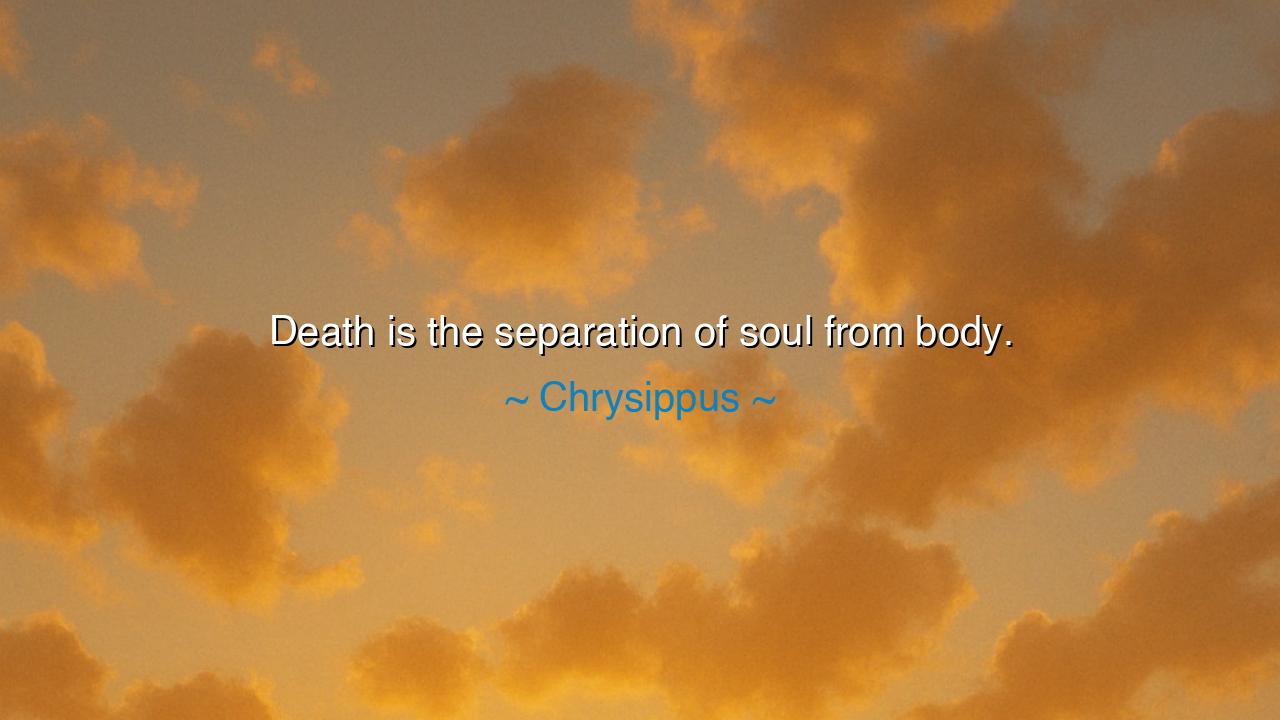
Death is the separation of soul from body.






“Death is the separation of soul from body.”
Thus spoke Chrysippus, the great Stoic philosopher of ancient Greece, whose mind sought to understand the laws that bind both heaven and earth. In these few words, he defined death not as annihilation, nor as an enemy, but as a natural division—a moment when what was once united by breath and spirit returns to its original elements. To him, the body belongs to the dust, and the soul to the divine fire that pervades the cosmos. Death, therefore, is not destruction, but dissolution, a change of form rather than the end of being.
The origin of this idea flows from the Stoic understanding of the universe as one great living organism, guided by reason, or Logos. Chrysippus, building on the teachings of Zeno and Cleanthes, believed that everything is part of a divine order, where all things come and go according to nature’s eternal rhythm. Just as dawn and dusk follow one another without rebellion, so too must life and death. When the soul departs from the body, it does not vanish; it returns to the great harmony from which it came. The separation is painful only to those who cling to illusion, for to the wise, it is simply nature continuing her course.
In this, Chrysippus echoes the wisdom of other seekers across the ages. The Egyptians spoke of the ka and the ba, the twin aspects of the soul that leave the body to journey beyond the veil. The Hindus taught that Atman, the inner self, is eternal, while the flesh is but a garment cast off when worn. The Stoic, however, speaks not of paradise or punishment, but of acceptance—the recognition that death is the rebalancing of elements, the moment when the flame returns to the fire and the clay to the soil.
Consider, then, the story of Socrates, who, though not a Stoic, lived the Stoic ideal. When condemned to die by the people of Athens, he drank the cup of poison calmly, reasoning that death was nothing to fear. “If it is nothingness,” he said, “then it is but a deep sleep. If it is a passage to another life, then it is a journey worth taking.” Socrates understood what Chrysippus later declared: that death is not the ruin of the soul, but its release. When the soul is freed from the prison of flesh, it returns to the great harmony of all things. Thus, the wise man greets death not with terror, but with reverence, as one who bows before the law of the universe.
Yet, to the untrained heart, the separation of soul and body feels like a wound—a sundering of love, a silence too great to bear. The Stoic does not deny this sorrow, but he counsels mastery over it. For grief is born of attachment, and attachment is born of the false belief that we possess what was only lent to us by nature. Chrysippus reminds us: the body, the breath, the loved ones we hold—all are entrusted to our care for a season. When they are taken back, it is not cruelty, but order. To resist is to suffer; to accept is to be free.
Therefore, O seeker, learn to live as one already reconciled to death. Do not shun it, nor dwell morbidly upon it, but hold it gently in your awareness. Let every sunrise remind you that life is a temporary flame, burning brightly before it joins the eternal fire. If you would prepare for the separation, live with unity now—keep your soul and body in harmony through virtue, reason, and compassion. For the man whose life is well-ordered fears not its end; his death will be a continuation of the peace he cultivated while alive.
So remember this: death is not the enemy of life, but its fulfillment. The body returns to the earth that nourished it, the soul to the spirit that animated it, and all things flow back into the great Whole. As the ancients taught, “Nothing is lost, only changed.” Live, then, not in fear of the parting, but in gratitude for the union. For when the hour comes that the soul must leave the body, you will not weep—you will rise, as naturally as a flame rises from the wick, into the infinite light from which it was born.






AAdministratorAdministrator
Welcome, honored guests. Please leave a comment, we will respond soon